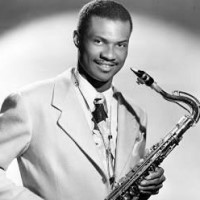Home » Jazz Musicians » Wild Bill Moore
Wild Bill Moore
In the summer of 1948, Texas tenor saxophonist Wild Bill Moore scored a hit on the R&B charts with a kicking number called "We're Gonna Rock, We're Gonna Roll," one of the first tunes whose title combined two words--"Rock" and "Roll"--that would define popular music for the rest of the 20th century, and beyond. Detroit's Wild Bill Moore, played alto sax early in life but his main interest was boxing. He was Michigan's amateur Golden Gloves light heavyweight champ for 1937, later turned pro, went back to sax and by 1945 was recording on tenor sax with the Slim Gaillard Orchestra, on the Queen label. Moore first recorded on his own in 1945, for the Apollo label, making the charts with "We're Gonna Rock," in 1948. Many of his recordings were made with session men from the Paul "Hucklebuck" Williams band, such as this track and his hit "Bubbles." In 1949 he recorded an updated version of his hit for Modern Records of Los Angeles and called it simply "Rock and Roll." Moore relocated to Detroit, continuing his search for that elusive next big record. He made a few jazz albums notably “Wild Bill's Beat” and “Bottom Groove,” for Jazzland in 1961. On both albums Moore was pushed by the same responsive bass-drums-conga team of Joe Benjamin, Ben Riley, and Ray Barretto, but “Wild Bill's Beat” featured pianist Junior Mance, while “Bottom Groove,” benefited from organ of Johnny "Hammond" Smith. Moore's extroverted tenor, whose upper register is indeed wild, is solid throughout.Both record were combined in the 2002 reissue of "Bottom Groove." Moore worked on the sessions of other artists in Detroit, particularly Marvin Gaye's Motown recordings, including "Mercy Mercy Me" which was on Gaye’s 1971 masterpiece “What’s Going On.” Eventually he returned to Los Angeles and spent the rest of his days there, until his death in August 1983.
Tags
Wild Bill Moore: Bottom Groove

by C. Andrew Hovan
In all honesty, the tile track of this disc, “Heavy Soul,” really says it all. Tenor saxophonist Wild Bill Moore lives up to his name with some rowdy slap tonguing and a clarion call that is not unlike that of another neglected tenor man of the ‘60s, Blue Note’s own Fred Jackson. His high note squawks at the end of the cut might have even given James Carter something to think about if he had copped these sides. Don’t expect ...
read morePhotos
Music
Recordings: As Leader | As Sideperson




















